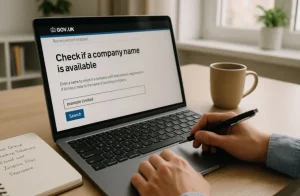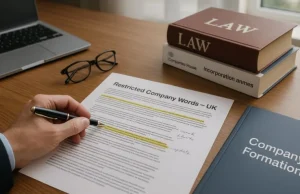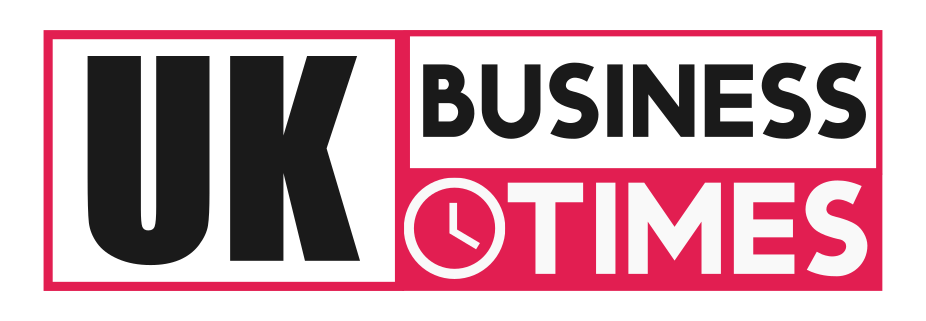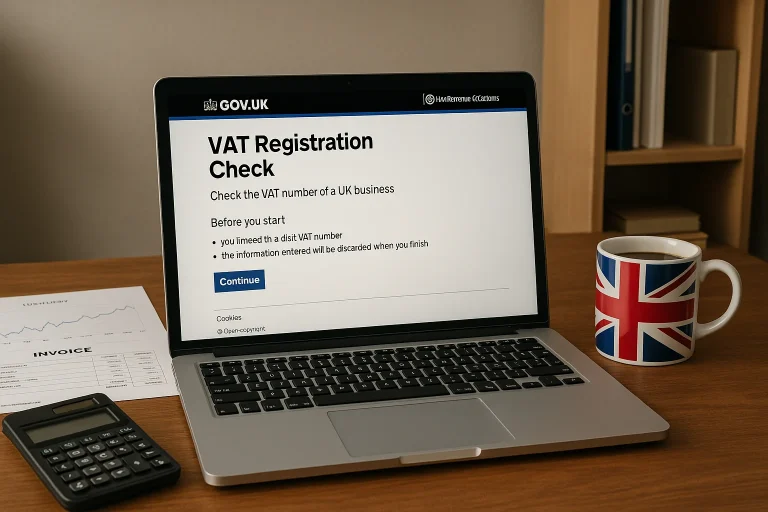Every entrepreneur dreams of building a brand that resonates, but before that journey begins, one critical step stands in the way, choosing a name.
For many, this might feel like a creative task, but in the UK, it’s far more than that. Naming a company isn’t just about appeal. It’s about legality, compliance, identity, and long-term viability.
This guide will walk through every detail of how to check name availability Companies House requires, with real-time methods, examples, and expert tips.
Why Does Choosing the Right Company Name Matter Legally and Commercially?

A company name is not just a creative choice. In the UK, it’s a legally binding identifier and becomes a part of your business’s public and financial identity. It’s how you’ll be recognised on contracts, invoices, tax returns, and even legal disputes.
Legal Significance of a Company Name
When you register a company, its name becomes an official part of the public record. It’s displayed in Companies House databases, HMRC systems, and on any legal or financial documentation.
Choosing a name that’s too close to another business can lead to serious consequences, from application rejection to expensive legal challenges.
Commercial and Branding Impact
Beyond legalities, your business name forms the foundation of your brand. It’s the first impression for clients, suppliers, and investors.
A generic, confusing, or inappropriate name can create trust issues. On the flip side, a unique and well-aligned name adds credibility and makes your brand memorable.
Visibility Across Platforms
A well-chosen name boosts SEO, secures your desired domain name, and improves recognition across social media. If your name is unavailable online, inconsistent branding can confuse potential customers and harm your digital presence.
The Impact of Your Business Name
| Category | Importance |
|---|---|
| Legal | Registers your entity, subject to UK laws and compliance |
| Branding | Shapes public perception and market positioning |
| Online Identity | Affects domain name, SEO, and social media handles |
| Reputation Risk | Avoids legal action and customer confusion |
| Long-term Growth | Supports future scaling and expansion |
Choosing the right name from the beginning is not just smart, it’s strategic.
What Rules Does Companies House Apply to Business Names in the UK?
Companies House enforces several strict rules when it comes to naming. These rules are designed to protect the public, prevent fraud, and ensure fair competition. If you don’t comply with these rules, your company registration will be rejected.
The “Same As” Rule
Your proposed name must not be the same as another registered company. Even small changes like punctuation, capitalization, or adding terms such as “UK” or “Services” may not be enough. For example, “GreenTech Ltd” and “GreenTech UK Ltd” could be considered the same.
The “Too Like” Rule
Even if a name isn’t exactly the same, Companies House might reject it if it sounds too similar to an existing company. This protects against potential confusion or misuse. Phonetic similarities, slight misspellings, and reordering words can all fall under this rule.
Sensitive or Restricted Words
Certain words are restricted due to their implications. Names that suggest a royal connection, government authority, or professional status require special permission. For instance, using terms like “Royal”, “Institute”, or “Chartered” demands prior approval.
Inappropriate or Offensive Terms
Companies House will reject any name that could be considered misleading, offensive, or contrary to public interest. This includes terms with vulgar meanings or names that might be socially or politically sensitive.
By understanding these rules in advance, you’ll avoid rejection and save time during the company formation process.
How to Check Name Availability at Companies House?

The easiest way to verify if your preferred company name is available is by using the official Companies House name checker. This online tool connects directly to the Companies House register, offering real-time data on existing company names, both active and dissolved.
Step-by-Step Process
- Go to the “Find and update company information” portal.
- Type your desired company name into the search bar.
- The tool will show:
- Exact matches (already registered and unavailable)
- Similar names (might fall under the “too like” rule)
- Previous names (dissolved or renamed, may still be protected)
What the Search Results Mean?
If your chosen name appears in the results as an active company, it’s not available. If it shows up under dissolved or previous names, you may still face rejection, especially within the name protection period (which can last several months).
For example, searching for “Urban Nest Interiors Ltd” might reveal:
- Urban Nest Interiors Ltd – Active
- Urban Nests Ltd – Dissolved (2024)
- Nest Urban Ltd – Previous name of an active company
These results mean you need to either modify the name or choose an entirely different one.
What Happens if My Preferred Company Name is Taken?
Don’t worry if the name you wanted is already taken. It’s a common issue, but it doesn’t mean your business idea is off track. With some smart tweaks, you can come up with a unique and compliant name.
Alternative Strategies That Work
Changing or adding specific words can help make your name distinct:
- Add your business niche or industry: Instead of “Pine Solutions”, try “Pine Office Solutions” or “Pine Retail Systems”.
- Use a geographical marker: “Harper Designs” can become “Harper Designs London”.
- Insert initials or founder names: “Bright Path Ltd” could become “JP Bright Path Ltd”.
- Rearrange the wording: “Creative Hive” might become “Hive Creative Group”.
Always double-check the new version using the Companies House tool to ensure compliance.
A rejected name can be a temporary setback, but with creativity and knowledge of the rules, you can still find a professional and available name that represents your brand.
Which Words or Phrases Are Restricted or Sensitive in UK Company Names?

Some words carry weight beyond branding, they suggest authority, status, or affiliation. That’s why they’re restricted.
Common Restricted Terms
- Royal Associations: King, Queen, Prince, Princess, Royal
- Government Implications: Authority, Commission, Department
- Professional Indicators: Architect, Chartered, Solicitor, Bank
- Institutional Terms: Institute, Federation, Foundation, Trust
Why Restrictions Exist?
These controls are in place to protect the public from being misled. A business that uses the term “National Authority” might falsely appear to represent the UK government, unless it genuinely has that connection.
How to Get Permission?
If you have a valid reason to use one of these words:
- Contact the relevant government department
- Submit supporting documents (such as a letter of non-objection)
- Provide background on your organisation and purpose
For example, if you want to use “Royal”, you’ll need approval from the Cabinet Office and must provide context showing a legitimate royal connection.
Allow several weeks for this process, as these approvals are not granted automatically.
Can My Business Name Be Rejected for Being Offensive or Misleading?
Yes. Companies House has the right to reject names that are offensive, culturally insensitive, or potentially harmful. This includes profanity, racist undertones, or misleading terms implying illegal activities or fake affiliations.
What Makes a Name Offensive or Misleading?
It could be a word with double meaning, references to hate speech, or phrases that mimic well-known public services. Sometimes, even acronyms that sound inappropriate when pronounced phonetically can be flagged.
Social and political contexts also matter. What may have seemed acceptable years ago could be considered offensive now, due to shifting public sentiment.
Before you apply, say your name aloud and consider how it could be interpreted by people from different backgrounds. Always err on the side of caution to avoid unnecessary rejection.
How Do I Know If My Name Is “Too Like” an Existing Company?
This is one of the most common reasons for rejection. A name might be technically different but still get flagged if it’s considered “too like” another.
What Triggers a “Too Like” Rejection?
- Phonetic similarity: “EZ Services Ltd” vs “Easy Services Ltd”
- Abbreviated substitutions: “4U” for “For You”
- Word reordering: “Bright Tech UK” vs “Tech Bright UK”
- Visual similarity: “MarketRite” vs “MarketRight”
The registrar considers how the name will appear and sound to the average person, not just the written difference.
Do I Need to Check Trademark Conflicts When Choosing a Name?

Absolutely. Registering a company name does not give you trademark rights. You could still face legal issues if the name infringes on someone else’s trademark, even if Companies House approves it.
How to Check the UK IPO Trademark Register?
- Visit the UK Intellectual Property Office (IPO) website.
- Enter your proposed name and variations.
- Review results for similar or identical trademarks in your industry.
What to Look For?
- Registered trademarks in similar classes or sectors
- Pending trademark applications
- Phonetically similar terms
- Names that could confuse customers
Even if your name passes Companies House checks, it’s good practice to register your trademark to protect your brand legally.
Should I Check Domain Name and Social Media Availability Too?
Yes. In today’s digital-first economy, your company’s online presence is critical. If your registered company name isn’t available as a domain or social handle, it can create inconsistency and customer confusion.
How to Check Online Availability?
Use tools like:
- GoDaddy or SeekaHost for domain names
- Namechk or BrandSnag for social media handles
Make sure your name is consistent across platforms such as:
- X (formerly Twitter)
- YouTube
Being available across all key platforms reinforces brand identity and improves customer trust.
What Should I Do if I Need Help or My Company Name Requires Approval?

If you’re unsure about the naming rules or need permission for restricted terms, professional support can save you time and stress.
When to Seek Help?
- If you want to use a sensitive or restricted word
- If your desired name is borderline under the “too like” rule
- If you’re launching a group company or brand family
You can reach out to:
- Companies House
- Trademark attorneys
- Company formation agents like Your Company Formations
They can guide you through permissions, documentation, and final registration.
Conclusion
Your company name is more than a label. It’s your legal identity, your brand’s first impression, and your business’s most permanent asset. In the UK, ensuring your name complies with all rules is just as important as creating a strong product or service.
From checking availability with Companies House, understanding legal restrictions, and avoiding sensitive words, to verifying trademark and domain conflicts, each step is crucial. Rushing this process or overlooking it could cost you dearly in rejections, delays, or forced rebrands.
Choose a name that’s compliant, distinct, and strategic. Let it reflect the credibility, values, and ambition of your business from day one.
FAQs
How do I check if a limited company name is available to register?
You can check availability by entering the name into the Companies House name search tool. It will show if the name is taken, too similar, or recently used.
Can I reserve a company name without registering?
No. In the UK, company names are only secured during the registration process. They cannot be reserved in advance.
What if my desired name is rejected?
You can make small but meaningful modifications like adding a location, industry, or descriptor to create a unique name that complies with the rules.
Do I need permission for certain words in my company name?
Yes, if your name contains restricted or sensitive terms like Royal, Institute, or Bank, you must get prior approval from the appropriate authority.
Why is it important to check domain and social media availability?
Even if the name is approved legally, inconsistent online availability can confuse customers. Matching your company name across platforms builds a stronger brand.
Can I include my personal name in the company title?
Yes, personal names are acceptable and commonly used, especially in professional services or small business branding.
{
“@context”: “http://schema.org/”,
“@type”: “FAQPage”,
“mainEntity”: [
{
“@type”: “Question”,
“name”: “How do I check if a limited company name is available to register? “,
“acceptedAnswer”: {
“@type”: “Answer”,
“text”: “You can check availability by entering the name into the Companies House name search tool. It will show if the name is taken, too similar, or recently used.”
}
},
{
“@type”: “Question”,
“name”: “Can I reserve a company name without registering? “,
“acceptedAnswer”: {
“@type”: “Answer”,
“text”: “No. In the UK, company names are only secured during the registration process. They cannot be reserved in advance.”
}
},
{
“@type”: “Question”,
“name”: “What if my desired name is rejected? “,
“acceptedAnswer”: {
“@type”: “Answer”,
“text”: “You can make small but meaningful modifications like adding a location, industry, or descriptor to create a unique name that complies with the rules.”
}
},
{
“@type”: “Question”,
“name”: “Do I need permission for certain words in my company name? “,
“acceptedAnswer”: {
“@type”: “Answer”,
“text”: “Yes, if your name contains restricted or sensitive terms like Royal, Institute, or Bank, you must get prior approval from the appropriate authority.”
}
},
{
“@type”: “Question”,
“name”: “Why is it important to check domain and social media availability? “,
“acceptedAnswer”: {
“@type”: “Answer”,
“text”: “Even if the name is approved legally, inconsistent online availability can confuse customers. Matching your company name across platforms builds a stronger brand.”
}
},
{
“@type”: “Question”,
“name”: “Can I include my personal name in the company title? “,
“acceptedAnswer”: {
“@type”: “Answer”,
“text”: “Yes, personal names are acceptable and commonly used, especially in professional services or small business branding.”
}
}
]
}







